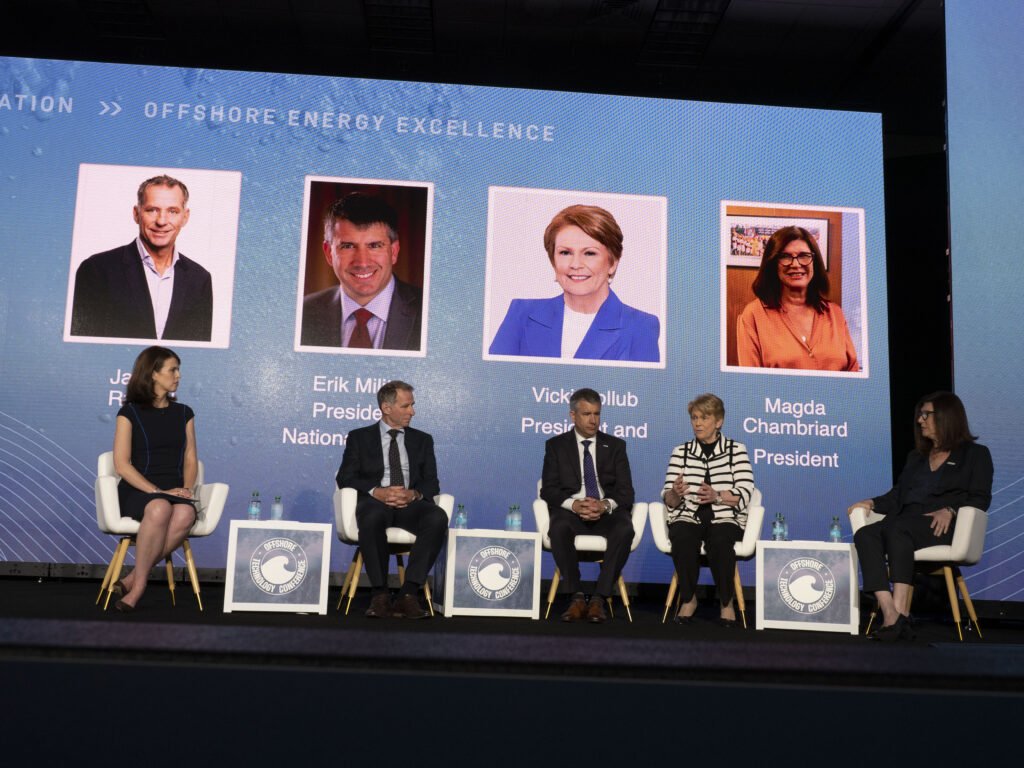13 May 2025, Houston, Texas – The latest edition of the Offshore Technology Conference (OTC) took place last week in Houston, USA, bringing together industry leaders to explore the future of offshore energy. One of the highlights was Brazil’s state-owned energy giant Petrobras, emphasising its commitment to energy security, exploration of new frontiers, and environmental sustainability. Global OTEC Founder and CEO Dan Grech attended the event, connecting with offshore operators to promote Ocean Thermal Energy Conversion (OTEC) as a solution for clean power generation at sea.
During the event, Petrobras President Magda Chambriard noted the company is focused on expanding renewable energy and low-carbon technologies. “Currently, according to our Strategic Plan, we aim to strengthen our position in ethanol, biodiesel, biogas, wind, solar, and hydrogen. All of this, together with CCUS (Carbon Capture, Utilization, and Storage), will contribute to our commitment to achieving net zero by 2050”, said.
Assuming the role as leader in exploiting new technologies, Petrobras also shared a goal to ensure energy security while accelerating decarbonisation. “Petrobras is ready to lead this journey, exploring new frontiers with environmental responsibility”, said its director of Exploration and Production, Sylvia dos Anjos.
As the offshore industry is entering a new chapter where energy security, innovation, and sustainability must be integrated, technologies like OTEC are beginning to gain more traction. With a particular capacity of meeting high demands while operating at sea, the OTEC Power Module®, developed by Global OTEC, for example, can be a game changer to provide power and decarbonise operations of oil rigs, FPSOs and enlarge the capacity of long subsea tiebacks.
Traditionally, diesel generators have met this need, but at a high environmental and logistical cost. OTEC provides a fundamentally different approach by capturing the temperature difference between warm surface seawater and cold deep seawater, generating uninterrupted electricity in tropical ocean regions. These are the same regions where much offshore development is concentrated, making OTEC a geographically and technically aligned solution.
Brazil is uniquely positioned to pioneer the use of OTEC for
*Photo by © OTC/Todd Buchanan 2025
offshore electrification. The country’s tropical waters offer optimal thermal conditions, and its track record of innovation in alternative energy, such as the development of ethanol in the 1970s, demonstrates a readiness to embrace pioneering technologies.
Global OTEC’s compact, modular approach makes the technology particularly well suited for integration with offshore facilities. OTEC can reduce reliance on diesel fuel, simplify logistics, and help operators meet tightening emissions regulations while maintaining operational continuity. “Every offshore operator I’ve spoken to agrees that they need megawatts of reliable, continuous power where conventional tiebacks can’t reach. OTEC answers that. It’s not just clean, it’s independent, scalable, and built for the realities of subsea processes”, highlighted Dan Grech.
But the benefits are not only environmental. Reducing fuel deliveries and increasing energy autonomy offshore can also lower costs and improve safety. For operators working in remote or high-risk environments, these gains are increasingly valuable.
As Petrobras and other offshore leaders commit to long-term decarbonisation strategies, OTEC offers a powerful tool to accelerate progress. It supports a resilient energy mix by delivering clean, baseload power in the same ocean that offshore operations depend on.
OTC 2025 demonstrated that the shift to clean energy is not a distant ambition; rather, it’s happening now. With the right technology and partnerships, the offshore sector can lead this transition by embracing clean, continuous power solutions like OTEC.
read our latest news and blog posts:
- Barbados Investment & Development Corporation (BIDC) signs MoU to collaborate on the development of sustainable ocean renewable energy with Global OTEC
- Understanding the OTEC cycles: Closed, open and hybrid
- Ocean Energy Education brought to Barbadian Students for World Ocean Day
- Offshore electrification through the ocean: how OTEC can provide clean baseload power 24/7 to operations at SeA
- The Baseload Power Source Almost No One Is Talking About
subscribe to our newsletter
Newsletter
"*" indicates required fields


